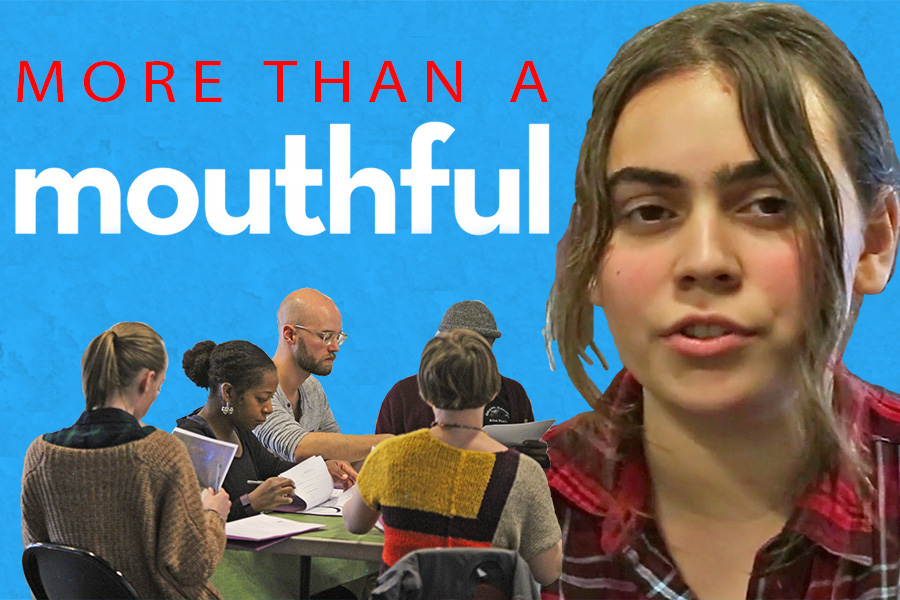Between this weekend’s Philadelphia Young Playwrights’ Mouthful Monologue Festival (April 13 at the Louis Bluver Theatre at The Drake) and the recent launch of season two of its “Mouthful” podcast, PYP founder-curator Mitchell Bloom makes it his life’s work to provide a platform for the words of those younger than he.
Bloom — a cis gay man who “values and affirms queerness in all of its beautiful variety” — says he wants to embolden the young people he works with. “They can go on their phones and see themselves reflected in another person, and on Instagram or Twitter, and know that there are spaces for them somewhere in the world, even if it’s not where they currently find themselves.”
The PYP festival performance includes 18 short monologues written by students and performed and directed by professionals. The podcast focuses on one teen monologue a week for 10 weeks, performed by an actor with host Trenae Nuri exploring the student playwright’s innermost thoughts. That the current season of monologues was written exclusively by female students makes Bloom’s podcast all the more unique. Tales of coming out, gun control, sexual harassment and bullying make both the “Mouthful” cast and the Monologue Festival radically topical.
“Both invite us into the thoughts and feelings of local middle- and high-school students, at a time when student voices are making headlines in America,” said Bloom.
The festival started in 2002 in collaboration with InterAct Theatre Company and the National New Play Network and has since become a staple of PYP’s annual programming. PYP took over sole production of the event last year, shortly before launching its podcast.
“We know that our students are dealing with and writing about — with intelligence, bravery and expertise — issues and challenges that are relevant to all of us,” said Bloom. “The power and savvy of young people has become especially apparent in the aftermath of the Parkland shooting. As an organization that works with teenagers on a daily basis, we’ve known that young people’s voices are powerful and that, given a platform, can be a catalyst for change, for a long time.”
Bloom says he finds LGBT issues particularly brave, exemplified in the festival this year by two monologues: “Swing Set,” written by eighth-grader Cecelia McKinney from Ridley Middle School and “Breaking Barriers,” written by 10th-grader Lisbet Espinal from Philadelphia Military Academy. In “Swing Set,” the speaker comes to the realization that she is bisexual, a topic through which the young McKinney has crafted a brilliant fiction.
“Like the typical teen, I spend a lot of time on social media and realized a lot of people were frustrated by the way bisexuality was not represented or accepted as valid,” McKinney told PGN. She discovered PYP through her mother who works at one of the schools where students write and submit monologues. “I saw a post that compared bisexuality to a swing because bisexuals ‘swing both ways.’ I thought it was clever, so I saved it, and when I went to write my monologue, I remembered it.” The piece was not specifically about her sexuality, she said. “I currently consider myself an ally, but labels can change. I’m only 14. I’ve got time to figure out who I am, what I like and, eventually, a label that represents me.”
In another monologue, “Breaking Barriers,” the speaker comes out to his mom. “As someone who can personally relate to the exact moment that Lisbet creates in the monologue, I am heartened by the way that the character approaches the admission from a place of love, and not from a place of fear,” said Bloom.
“I was deeply closeted in high school,” he said. “I never would have dreamed of writing something personally revealing about my sexuality, let alone sharing it widely in a setting like the festival or the podcast. At that point in my life, in my small town in western Pennsylvania, the idea of coming out was terrifying to the point that I repressed my emotions, even after I started secretly dating a boy. I told myself I wasn’t gay, I just fell in love with a person who happened to be of the same sex.”
Bloom said he admires the bravery and courage of young people writing about topics that are so personal to them. “Even if the writer is not writing from a place of personal experience, to tackle these issues and be willing to engage with them publicly is inspiring to me. I wish I had the courage to be myself in high school.”
Bloom’s perception is that young people are on a whole different (and more provocative) level in terms of sexuality and gender identity. “The most progressive among them are not concerned with binaries and think of both sexuality and gender as fluid,” he said. “They certainly seem more accepting of queer identities of all kinds, and I think that fact is reflected in the entertainment and media that they consume and create. My perception is that young people are interested in telling stories about queer experiences of all kinds that are more nuanced than just ‘this person is gay or trans’ and that’s the most interesting thing about them.” We’ve had students in a queer theater workshop write plays who are undeniably queer, but they are not “about” being queer. It might seem like a minor distinction, but I think it’s incredibly inspiring and speaks to the advanced way that young people are thinking about sexuality and gender. It’s not reductive. It’s nuanced, it’s lived and it’s forward-thinking.”
“Mouthful” is available on all major podcast platforms (iTunes, Stitcher, Google Play, TuneIn) and can be streamed via the website: www.mouthfulpodcastphilly.com.

